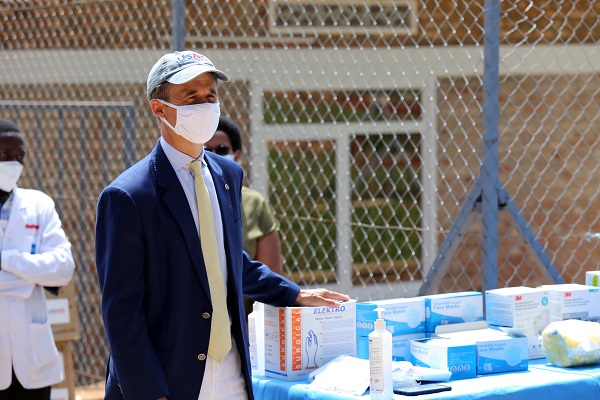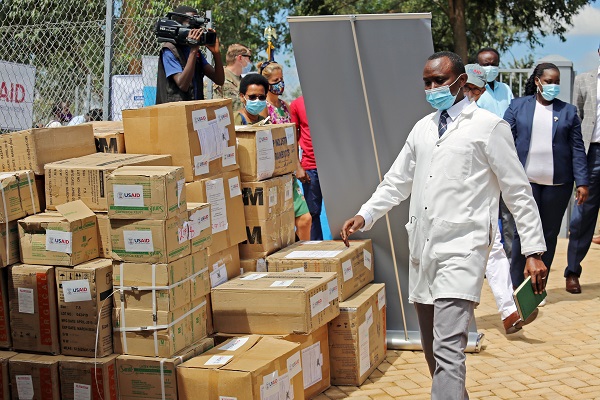
The United States donated more than 200 million Rwandan francs worth of medical supplies to Rwanda to protect doctors, nurses, other medical workers, and their patients from COVID-19.
U.S. Ambassador Peter H. Vrooman led a handover of a portion of the supplies at Nyamata Hospital, delivering boxes of N95 and surgical masks, surgical and non-surgical gloves, and gumboots.
The new protective medical supplies were funded by the U.S. Department of Defense and handed over to the USAID Ingobyi Project, which works with the Ministry of Health in Rwandan district hospitals, health centers, and at the community level.
The supplies, known collectively as Personal Protective Equipment-or PPE-are critical for Rwanda’s frontline healthcare workers to stop the spread of COVID-19.

The PPE allow healthcare workers to protect themselves and their patients, including those who need routine or emergency medical care during the global COVID-19 pandemic.
The handover event took place at the Nyamata Hospital in Bugesera district, one of eight hospitals where USAID has funded isolation units designed to treat patients with highly infectious diseases like COVID-19.
Ambassador Vrooman was joined at the event by the Ministry of Health’s Director General of Clinical and Public Health Services, Dr. Zuberi Muvunyi, as well as Nyamata Hospital officials and representatives from USAID Ingobyi, USAID Rwanda, and the U.S. Department of Defense.
The donation was supported by the U.S. Department of Defense’s Overseas Humanitarian Disaster Assistance and Civic Aid (U.S. OHDACA) funding. This funding is a unique humanitarian assistance program that builds Rwanda’s Ministry of Heath effectiveness to prepare and respond to COVID-19. U.S.
OHDACA funding to Rwanda demonstrates and advances the strong U.S. commitment to health in Rwanda.
Today’s U.S. donation of medical supplies is part of the more than 11 billion Rwandan Francs that the United States has contributed to the COVID-19 response in Rwanda.
This support includes the construction of hand washing stations in districts across Rwanda; support for public communications to fight COVID-19; vehicles to support contact tracing; medical equipment such as 100 state-of-the-art ventilators, patient monitors, hospital beds, and intensive care units; and other medical supplies such as biohazard bags, alcohol, hand washing soap, and personal protective equipment. (End)
